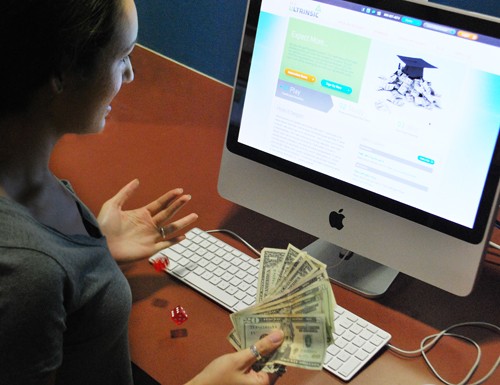Is getting $25 enough incentive for you to get that “”A”” in that traditions and cultures course? What about $100? The website Ultrinsic has started taking bets on grades from students at 36 U.S. college campuses earlier this month.
Students create an account on the website, submit their class schedules and give Ultrinsic access to their academic records. Ultrinsic then calculates students’ odds based on this and any other information it can find about the classes according to CEO Steven Wolf in an article from The Associated Press. Students can deposit money into their accounts with a credit card, and then can place their wagers starting with a cap of $25 that increases with additional user activity. Ultrinsic also offers “”grade insurance”” in case students do not get the grade they wagered on.
Steve Barham, associate coordinator of the UA’s Race Track Industry Program and an expert on racing law and regulations, said there are three factors that determine if something is gambling: a wager or fee, chance and a payoff. Ultrinsic clearly has the first and third factor, he said.
“”The question then is, is it a game of skill or is it a game of chance,”” Barham said.
Barham used sports betting to illustrate his point. Skill between two teams is involved and your own skill of choosing, but there is also an element of chance, he said. Player injuries, calls by referees and fumbles can all affect the outcome of a game.
He said Ultrinsic seems to be in a “”vague”” legal area.
Based on Arizona gambling statutes, UA students may not be in legal trouble if they were to use Ultrinsic, according to Susan Ferrell, the adviser at the Associated Students of the University of Arizona Legal Services.
“”In Arizona it isn’t illegal to gamble, but it is illegal to be promoting the gambling or organizing it,”” she said. “”So it seems students would be in the clear anyway. It would be the organizers of this website who would be risking criminal prosecution.””
However, according to Ferrell, since Ultrinsic’s services are offered online and based in New York, it is unclear what action, if any, Arizona prosecutors could take against any UA participants. Inquiries to the attorney general’s office were not returned in time for this article.
Barham finds the website to be an interesting business model, but said he is troubled by Ultrinsic’s target audience.
“”I’m not naive enough to think 18 year olds don’t gamble or anything like that. Gambling in and of itself doesn’t bother me,”” Barham said. “”Internet wagering does not bother me with reputable firms that are regulated.”” But he said he believes betting on grades between parents and their children would be safer than wagering through Ultrinsic.
“”(Ultrinsic) may be as pure as the driven snow, but giving out credit cards, Social Security numbers to somebody that’s not regulated or, I don’t know, I’ve got a little problem with that,”” he said. According to its terms of services, students who earn $600 or more must submit their Social Security numbers to Ultrinsic for IRS Form 1099, which is used for income other than wages, salaries and tips.
Dustin Blasius, an accounting graduate student, said he wouldn’t use Ultrinsic. “”I’m not really the gambling type,”” he said. “”I’m not a high-risk taker. I’ve been to Vegas and played the slot machines, but it’s not something I get a lot of satisfaction out of.””
But Blasius didn’t deny that there were some undergraduate elective classes he aced that he would have bet on, given the opportunity.









